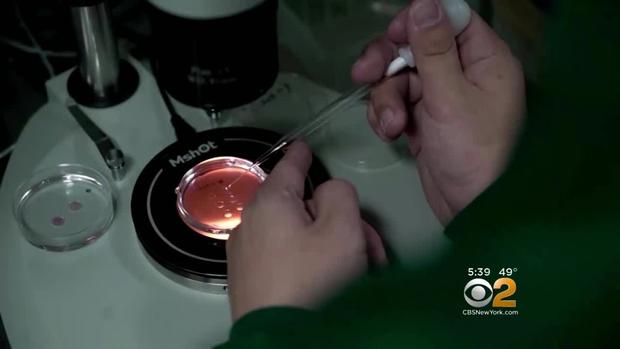Science Community Condemns Chinese Researcher's Claim About Engineering First 'Designer Baby'
NEW YORK (CBSNewYork) -- A Chinese researcher claims to have made the world's first so-called "designer baby."
The highly controversial experiment used a powerful new genetic-editing tool to alter an embryo's DNA, CBS2's Dr. Max Gomez reported Monday.
The gene-editing technique has been theoretically possible for some time, but actually using it on a human embryo is banned in the U.S. and other countries. The birth was revealed at a conference in Hong Kong, but has not been published in a scientific journal or independently verified.
The Chinese researcher told The Associated Press he helped create the world's first genetically edited babies. They are twin girls whose DNA he claims to have altered when they were embryos.
"I feel a strong responsibility that it's not just to make a first, but also make it an example," Dr. He Jiankui said.
MORE: Embryonic Gene Editing Could Wipe Out Several Conditions, Researchers Say
Jiankui said he modified embryos for seven couples during fertility treatments. One resulted in the birth of the twins this month.
During IVF, one sperm cell was inserted into and egg. After fertilization, a DNA-editing technique called CRISPR-Cas9 was used to disable a very specific gene that allows the AIDS virus, HIV, to infect white blood cells. The goal was to render the babies immune to HIV.
Despite that, the response to the announcement was near universal condemnation.
"In cases where the potential risks are substantially higher than the benefits, which I think is the case here, that is not ethical. I would say no babies should be born at this time, following the use of this technology," said Dr. Kiran Musunuru of the University of Pennsylvania.
MORE: Scientists Breed Healthy Mice With Same-Sex Parents
While this kind of gene editing has been tried to treat serious adult diseases, the DNA changes stay in that person. Sperm, egg or embryo gene editing make changes that can be passed on to all future generations and there are often so-called "off-target" effects where other genes are also altered.
There are also concerns it could lead to "designer babies," allowing parents to choose traits like hair and eye color or even intelligence and athletic ability. Those last traits are determined by combinations of many, many genes and will be much harder to manipulate.
Meanwhile, the universities where the researcher and his American collaborator had worked say they are currently on unpaid leave and are calling for an investigation.




